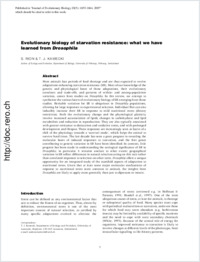Evolutionary biology of starvation resistance: what we have learned from Drosophila
- Rion, Stéphanie Section of Ecology and Evolution, Department of Biology, University of Fribourg, Switzerland
- Kawecki, Tadeusz J. Section of Ecology and Evolution, Department of Biology, University of Fribourg, Switzerland
-
21.07.2007
Published in:
- Journal of Evolutionary Biology. - 2007, vol. 20, no. 5, p. 1655-1664
English
Most animals face periods of food shortage and are thus expected to evolve adaptations enhancing starvation resistance (SR). Most of our knowledge of the genetic and physiological bases of those adaptations, their evolutionary correlates and trade-offs, and patterns of within- and among-population variation, comes from studies on Drosophila. In this review, we attempt to synthesize the various facets of evolutionary biology of SR emerging from those studies. Heritable variation for SR is ubiquitous in Drosophila populations, allowing for large responses to experimental selection. Individual flies can also inducibly increase their SR in response to mild nutritional stress (dietary restriction). Both the evolutionary change and the physiological plasticity involve increased accumulation of lipids, changes in carbohydrate and lipid metabolism and reduction in reproduction. They are also typically associated with greater resistance to desiccation and oxidative stress, and with prolonged development and lifespan. These responses are increasingly seen as facets of a shift of the physiology towards a ‘survival mode’, which helps the animal to survive hard times. The last decade has seen a great progress in revealing the molecular bases of induced responses to starvation, and the first genes contributing to genetic variation in SR have been identified. In contrast, little progress has been made in understanding the ecological significance of SR in Drosophila; in particular it remains unclear to what extent geographical variation in SR reflect differences in natural selection acting on this trait rather than correlated responses to selection on other traits. Drosophila offers a unique opportunity for an integrated study of the manifold aspects of adaptation to nutritional stress. Given that at least some major molecular mechanisms of response to nutritional stress seem common to animals, the insights from Drosophila are likely to apply more generally than just to dipterans or insects.
- Faculty
- Faculté des sciences et de médecine
- Department
- Département de Biologie
- Language
-
- English
- Classification
- Biological sciences
- License
-
License undefined
- Identifiers
-
- RERO DOC 8089
- DOI 10.1111/j.1420-9101.2007.01405.x
- Persistent URL
- https://folia.unifr.ch/unifr/documents/300319
Statistics
Document views: 176
File downloads:
- pdf: 327
